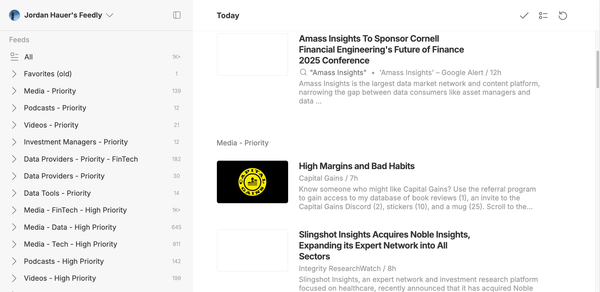Amassed Insights #4: MacroVolatility
How Trump’s Tariffs Just Flipped Data Sourcing on Its Head (Plus M Science v. Yipit Drama)

Sourcing Data in this Era of Macroeconomic & Geopolitical Volatility
This year's rapid shifts in public policy and the global political landscape, particularly the yo-yoing of proposed tariff rates, have highlighted the necessity for most organizations to keep track of unique macroeconomic news and events in real-time. Most companies aren't well-equipped to monitor policy changes that are highly impactful to them, especially for those that are esoteric or nuanced, as gathering information from external sources hasn't been a priority historically. It's incumbent upon those companies to at the very least identify and monitor the governmental organizations and policy groups that can drive their outcomes. Even better to keep a keen eye on macro-level consumer pricing and transaction trends as well as supply chain-related datasets to build a well-rounded viewpoint on how consumers and businesses are responding to tariff-related trade shocks.
Large, data-driven asset managers typically already have the infrastructure, relationships and culture to be able to quickly shift their data sourcing priorities along with these changes. But some, particularly long/short equity investors, haven't historically prioritized macroeconomic data sources as they may believe all beta has been hedged out of their portfolio. All of a sudden, I've been seeing this mindset finally crumble since news of Trump's tariff whims shift markets daily. However, sourcing and employing unique data that focuses on countries, hard-to-find government filings, and election predictions/results isn't easy. It's super important to understand the trustworthiness of your sources and their timeliness.
In our taxonomy, the main data categories relevant to this topic include "Macroeconomic", "Supply Chain", "Public Policy", "Open Government", "Government/Regulatory Risk", "Government Financials", and "Elections". We've sourced ~3,646 data providers focusing on at least one of those categories! Besides the largest well-known financial market data providers, here's a small sample of the macro-focused data providers that should be on every asset managers' radar:
- Haver Analytics (Data Profile)
- Brief: Time series data on economics and finances for macro research, including the developing world.
- World Bank Open Data (Data Profile)
- Brief: Data updates on exchange rates, equity markets, emerging market bond indices, industrial production and merchandise trade.
- Trading Economics (Data Profile)
- Brief: Provides historical data, economic forecasts, news, and trading recommendations.
- Exante Data (Data Profile)
- Brief: Provides in-depth macro-thematic research, capital flow analysis, and data-driven investment and trading strategy.
- ISI Markets (fka EPFR Global) (Data Profile)
- Brief: Provides fund flows and asset allocation data to financial institutions, showing the fund origin and destination of moving assets.
- FreightFlows (Data Profile)
- Brief: Provides predictive analytics for global trade.
- SONAR (Data Profile)
- Brief: Allows to access freight market data points through maps, charts, flash media content and news.
- Trade Data Monitor (TDM) (Data Profile)
- Brief: Provides monthly import and export statistics from customs agencies, statistics institutes, and other sources.
- Truflation (Data Profile)
- Brief: Aggregates, calculates and publishes the daily, unbiased, real-market inflation and economic data.
- BCMStrategy (Data Profile)
- Previously featured in Amassed Insights #2
Recent Macro-related News

- Alternative Data for Macro Analysis by Mikheil Shengelia
- My Take: Not only have macro funds and CTAs been evolving their data usage as described in this article, but equity-focused funds have also been increasingly evolving their macro data usage, particularly in this new geopolitical regime.
- Even the most sophisticated investors are scrambling for intel on the tariffs by Bradley Saacks
- My Take: Data-driven hedge funds are scrambling to source country-level consumption data in the wake of Trump's tariffs, specifically about countries like Canada and Vietnam.
- Navigating the tariffs data minefield by Waters Technology
"In an era of volatility and uncertainty, what datasets can investors employ to understand how potential tariffs could impact them, their suppliers, and their portfolios?"
Upcoming Events I'll Be Speaking At
- Boris Liberman from Lowenstein Sandler LLP and I will have a fireside chat about alternative data compliance onboarding, taking into account the novel effects of AI, at BattleFin in NYC at 9:25 AM next Wednesday, Jun 11. We'll delve into legal best practices for data vendors as well as asset managers when monetizing or procuring new datasets, as well as the newest questions to expect in due diligence questionnaires (DDQs) regarding the evolving AI or web scraping concerns. My summary of Lowenstein's article about this topic in the next section below (as well as in my previous post) serves a teaser for what to expect in this talk.

- I'm co-hosting the second edition of the Alternative Data Breakfast Series tomorrow, June 10 at 8:15 AM in NYC. Boris Liberman from Lowenstein Sandler, Evan Reich from Verition Fund Management, Michael Watson from Hedgineer, Richard Rothenberg from Global AI and I will explore using AI within institutional investing. The panelists will discuss the past, present and future of AI's impact on alternative data and asset management, ranging from the front to back offices and from data providers to data buyers. Let me know if you'd like to receive invites to events like these.
Data-Related Legal & Compliance News
- In my last two posts, I've commented on the ongoing Yipit & M Science civil litigation. To catch you up: M Science poached a couple high-level salespeople, Pinsky & Emmett, from Yipit and Yipit later accused them of stealing confidential client information and attempting to steal their clients, particularly at the end of those clients' subscription periods. Thanks to my friends at Glacier Network, who have been dutifully attending the court hearings on this case (in addition to other relevant alternative data-related cases), I was told the latest hearing went very poorly for Yipit. "The judge seems to broadly accept that employees did steal information from Yipit and bring that info to M Science, but is skeptical that Yipit has shown/can show that the malfeasance was the reason for client churn. The judge was also frustrated that the parties haven't been able to enter consent judgments (settlements) with Pinsky and Emmett - and mostly placed the blame for that on Yipit." The judge was very critical of how much Yipit has been spending to pursue this case, instead of finding a reasonable settlement. So far, Yipit only identified 5 clients they believe churned because of this, but M Science pointed out that most of these have either already been clients of theirs for a while or had begun discussions with them well into the past. And at least one of them isn't even an M Science client anyway! Clearly, it seems a settlement is coming and while there is clearly some smoke here, there doesn't seem to be much fire.
- Key Considerations for Alternative Data and AI Vendors to Investment Firms: Demonstrating Compliance in the Face of an Evolving Regulatory Environment by Lowenstein Sandler
- My Summary:
- State regulators may step in to impose regulation if the federal agencies like the SEC shift towards deregulation and take a step back from active enforcement.
- This regulatory uncertainty means that investment firms should maintain their diligence practices, and comply with regulations like Section 204A of the Investment Advisors Act of 1940 covering insider trading.
- Vendors should do the following:
- Prepare a DDQ.
- Details on data provenance, such as all the sources of their information and the various parties' rights and licenses
with AI systems, consider having a training cutoff date since stale data is less likely to include material non-public information (MNPI). - Understand Insider Trading and MNPI Concerns.
- Have an escalation plan for Legal/Compliance issues.
- Consider adopting a formal set of compliance policies, covering confidential information, data privacy, insider trading and MNPI.
- Conduct Regular Compliance Training for Employees.
- Prepare for Followup Questions, particularly about your rights to your data.
- Be Prepared!
- In data license agreements, vendors should be ready to:
- Accept firm reps and warranties about their data's provenance, with a keen eye on relevant local laws and regulations.
- Notify clients of adverse events affecting the data or AI systems.
- Include the same reps and warranties in a trial agreement, but only covering stale data.
- Forego auto-renewals.
- Forego broad on-site audit rights in the event of a suspected breach in favor of reasonable cooperation with the client.
- Enable clients to firmly protect their own confidential information.
- My Summary:
- CFPB Quietly Kills Rule to Shield Americans From Data Brokers by Dell Cameron, Dhruv Mehrotra
- My Take: Not at all a surprising development considering this administration's cost-cutting measures and disdain for the CFPB. Data brokers in America will continue to be able to operate in a laissez faire manner.
- DOJ Rule Restricting Sensitive Data Transfers Takes Effect by Miller Canfield
- My Take: If you're a data provider selling or transferring data to Russia, Iran, North Korea, Cuba, Venezuela, or China (including Hong Kong and Macau), take a very close look at these new restrictions that already are in effect! Most data products I know of would meet the very loose requirements set forth, such as precise geolocation data on 1,000+ U.S. devices or personal financial data collected on 10,000+ U.S. persons. Even if you're not selling to these countries, you may want to update your data license terms to ensure your downstream partners aren't as well!
- Did OpenAI train on copyrighted book content? by Asimov’s Addendum
- My Take: The AI Disclosures Project studied the extent to which OpenAI's LLMs were trained on copyrighted O'Reilly Media books without proper authorization. In summary, it seems that GPT-4o was materially stronger at recognizing paywalled content than previous models or smaller models. This suggests that OpenAI has started including the LibGen database in its training (which includes copyrighted content like O'Reilly books), significantly increasing the risk to highly-regulated users of this model.
Data Being Requested
If this request reasonably matches with a data product you represent or are aware of, please respond.
US Credit Card Transactional Data
- In light of the recent consolidation of Earnest into Consumer Edge (referenced below), we've been hearing from data buyers looking around for novel sources of US credit card transactional data. We've put together a landscape of 14 data providers, covering:
- The most popular, well-known and/or respected vendors.
- New entrants or offerings to explore or, at least, be aware of.
- Biases and skews inherent to each panel.
- Are there any US credit card transactional data providers we are missing?
- Are there any companies sitting on valuable US transactional data that have yet to monetize it? Now might be the best time in a long time to pursue this.
If you'd like us to source data that fulfills your unique requirements:
Data Providers & Products
If any of the following data providers piques your interest for any reason, respond and I'll share additional materials & directly introduce you, if necessary.
New Data Providers
- SOV.AI (Data Profile)
- Main Data Category: Financial Data-Driven Investment Research
- Brief: Provides AI-driven financial datasets, including government filings, lobbying data, clinical trials, institutional trading, and sectorial insights.
- Derivox (Data Profile)
- Main Data Category: Financial Market Data
- Brief: Provides daily end-of-day interest rate curves, including spot, forward, and discount factors for risk-free rates designed for use in valuation, accounting, and risk systems.
- Whoisology (Data Profile)
- Main Data Category: Company Information
- Brief: Database that archives and indexes domain ownership information, enabling users to search, track, and analyze connections between domains and their owners for cybersecurity investigations, corporate intelligence, legal research, and brand monitoring.
- CostQuest Associates (Data Profile)
- Main Data Category: Location - Consumers & IoT
- Brief: Provides geospatial broadband infrastructure data, including serviceable locations and network cost models, supporting investment decisions in telecommunications and infrastructure sectors.
- Bond Radar (Data Profile)
- Main Data Category: News - Finance
- Brief: Provides real-time news and analysis on global primary bond markets, covering new issues, pricing, and market trends.
Partnerships + New or Updated Data Products
- Introducing a New Standard in Medical Claims Intelligence: Hydrus Signal+ by Julia Fitzgerald
- Komodo Health Partners with Nasdaq to Deliver First Integrated Healthcare-Specialized Data Insights to the Financial Services Industry by Business Wire
- Smartkarma Partners with HarmoniQ Insights to Strengthen Data Offerings and Expand Reach to Systematic and Quant Investors by Smartkarma
- My Take: More investment research distributors need to include alternative data into their platforms to differentiate their offerings.
- Bloomberg Expands Alternative Data Offering with Web Traffic Data from Similarweb by Bloomberg
- My Take: Bloomberg's Alternative Data ("ALTD") function includes consumer transactional data from their subsidiary Second Measure, foot traffic data from consumer location provider Placer.ai, and now web traffic data from clickstream provider SimilarWeb. Coverage has doubled to 3,000 public and private companies.
The ubiquity of the Bloomberg terminal within asset managers begs the question: is the time coming when licensing data directly from dozens or hundreds of alternative data providers will no longer be necessary? At the same time, are alternative data vendors cannabilizing their own businesses by including their data in the Bloomberg terminal? I think we'll intuitively know those answers in a year or two when tracking the number & quality of providers included in ALTD and whether the best decide to stay on the terminal long-term.
- My Take: Bloomberg's Alternative Data ("ALTD") function includes consumer transactional data from their subsidiary Second Measure, foot traffic data from consumer location provider Placer.ai, and now web traffic data from clickstream provider SimilarWeb. Coverage has doubled to 3,000 public and private companies.
- DataBurning and Vumonic Announce Partnership for India E-Receipt Data by Michael Mayhew
- Databurning, a China-based provider of alternative data and digital solutions, recently announced a strategic partnership with India-based Vumonic Datalabs, a pioneer in e-receipt technology, to exclusively market Vumonic’s industry-leading India e-receipt panel data to financial institutions and corporations.
- Strategic Development Fund and QuantCube Technology Launch Joint Venture to Drive AI-Powered Real-Time Data Analytics in the UAE by QuantCube
- The Joint Venture aims to make AI-powered nowcasting tools and alternative data analytics available to decision-makers in the Middle East.
M&A + Funding
- Datasite Acquires Leading Private Market Intelligence Company Grata with $500 Million Investment Commitment by Datasite
- My Take: Just a couple weeks after I attended Grata's event about data being a strategic asset within M&A, they proved their point by being acquired! I'd bet/hope they were able to inflate their acquisition price by proving some strategic advantages their data enables, beyond a traditional DCF analysis.
- Monda Acquires Amplify Data to Power Customizable Data Sharing for AI by Monda Labs, Inc.
- My Take: I love the combination of these two companies: Monda's excellent at creating a storefront for a provider's data products and Amplify is excellent at delivering those products to end users through numerous channels. Bringing these two together makes the go-to-market process of a data provider that much easier.
- Consumer Edge to Acquire Earnest Analytics, Marking a New Era of Innovation in the Alternative Data Space by Consumer Edge
- My Take: Is this finally the beginning of further consolidation in transaction data? At the very least, this simplifies the data buying decisions of funds that would like their transaction data analyzed & interpreted on their behalf. If Consumer Edge transaction data wasn't table stakes before, it certainly is now.
- Fortress Backs Dataminr With $100 Million Convertible-Bond Deal by Carmen Arroyo
- Dataminr has secured $100 million in financing from Fortress Investment Group, the second fundraise in a little over a month for the artificial-intelligence platform that was valued at $4.1 billion.
- Gulp Data Estimates 23andMe’s Data Assets to Be Worth $289 Million Amid Bankruptcy Concerns by Business Wire
- My Take: Gulp Data almost hit the nail on the head with this valuation, when weeks later 23andMe was acquired for about 10% less than their estimate. Incredible, but was it luck or skill? Doesn't matter, it's the best proof of their methodology they could ask for!
- Humach Acquires Markets EQ Adding AI-Powered Emotional Intelligence to The Digital Workforce of Tomorrow by Business Wire
- TipRanks Expands Portfolio: Acquires Main Street Data by Arnab Shome
TipRanks, the Israeli market research aggregator, has acquired Main Street Data, a visual-first equity research platform, for an undisclosed sum to meet the dataset needs of its “enterprise clients” and also traders...
“The unique company KPI data and charting abilities of Main Street Data further position TipRanks as the leading research platform for non-institutional investors." - Uri Gruenbaum, CEO of TipRanks
17 Data Providers Featured, including:
- Boardroom Alpha (Data Profile)
- Main Data Category: Accounting and Governance Risk (AGR)
- Brief: Provides data and analytics on governance, executive performance, insider trading, board composition, institutional voting, and SPACs for all U.S. public companies.
- StockTwits (Data Profile)
- Main Data Category: Social Investor Network
- Brief: Social media platform designed for sharing ideas between investors, traders, and entrepreneurs. Tracks social/sentiment data from multiple primary sources to generate signals on various equities.
- My Take: This data product was reasonably popular with hedge funds many years ago, but hadn't been a focus of the company for a long time...until now.
Recent News, Blogs & Podcasts
42 Featured Articles, including:
- Google dominates AI patent applications by Ina Fried
- My Take: Do you think tracking patents systematically can be a significant source of alpha-generation? I certainly do, but only if you do so intelligently and enrich/map the patents accurately.
- India Alternative Data Landscape and Trends by Mikheil Shengelia
- In this report, we discuss India’s strong economic growth, supported by infrastructure projects, higher incomes, and important policy changes. We also look at how the financial system is changing, including the stock market, private investments, and growing interest from hedge funds. The fast-growing fintech industry and the rise of alternative data are also covered. Finally, real-world case studies featuring various alternative data vendors are showcased, followed by comprehensive vendor comparison matrices to aid in evaluation and decision-making.
- Clickstream 101: How to find a reliable clickstream provider by Teresa Lee
- We live in an age where every digital move is trackable. When captured (and appropriately anonymized and privacy-secured), this data can provide a stream of signals that are gold dust for businesses.
- From training to inference: The new role of web data in LLMs by Or Lenchner
- My Take: Love the idea to integrate unique data at inference time when querying an LLM.
- Fintech's Latest Trend: AI Agents For Investment Research by Jeff Kauflin
- Companies of all sizes, ranging from trading app Robinhood to 10-person New York startups, are now using AI to speed up and improve investment research.
- From enormous payouts to pink slips: What it's like to work at a hedge fund right now by Bradley Saacks, Alex Morrell
"These aren't places to build a career usually," said one former portfolio manager who has worked at several of the biggest multistrategy hedge fund firms. "It's a place to survive and get paid while you can,[...]because you don't know when things will turn against you."
- Data and Defensibility by Abraham Thomas
- When does data confer defensibility?
- #384 Ken Griffin: Founder of Citadel and Citadel Securities by David Senra
- My Take: If you'd like a deep dive into the head of Ken Griffin, the founder of one of the secretive behemoths of the hedge fund industry, I highly recommend this podcast.
- The Ben Cohen Episode by The Alternative Data Podcast
- Ben Cohen, former Global Head of Data Strategy at WorldQuant and now on gardening leave before his next opportunity[...] talk[ing] about the data sourcing role, how it has changed, who to hire for a team, how the data world is changing and the impact of AI.
17 Events Featured
10 Upcoming Events, including:
- Substantive Research's Unbunding Uncovered New York 2025 starts on Jun 12, 2025 in New York.
- Morningstar's Investment Conference 2025 starts on Jun 25, 2025 in Chicago.
- A-Team Group's AI in Capital Markets Summit New York 2025 starts on Jun 26, 2025 in New York.
- Massachusetts Institute of Technology's China International Conference in Finance 2025 starts on Jun 29, 2025 in Shenzhen.
- CFA Society Boston's Digital Alpha Series: AI Use Case & Integration 2025 starts on Jul 22, 2025 in Boston.
7 Recent Events of Interest, including:
- Battle of the Quants New York City 2025 happened on May 6, 2025 in New York.
- SIIA's FISD Alternative Data Council 2025 happened on May 21, 2025 in New York.
- Rebellion Research, Fordham University's QuantVision 2025: Fordham’s Quantitative Conference & Data Summit happened on May 22, 2025 in New York.
- WatersTechnology's Tech & Data in Financial Markets 2025 happened on Jun 5, 2025 in New York.






